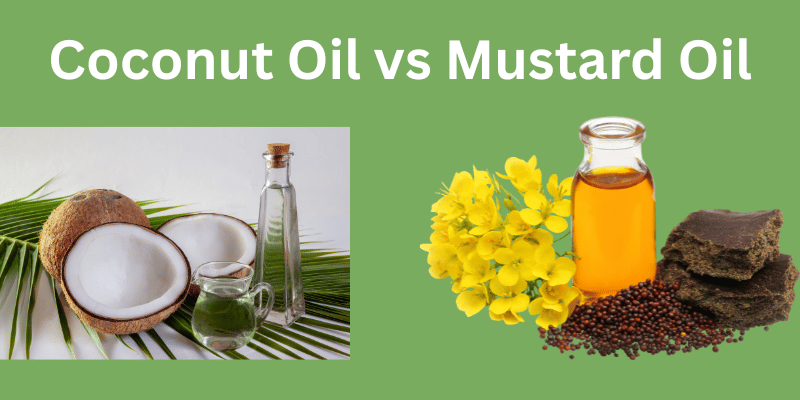Coconut Oil vs Mustard Oil Which Is Better for Hair
Published: 14 May 2025
Introduction
Coconut oil vs Mustard Oil, compared to mustard oil, is used for cooking, skin care, hair, and even for ancient massage sessions. Although both oils have their respective benefits, both, especially in the southern Asian countries like India, Pakistan, Bangladesh, and Sri Lanka, have been used for several centuries.

Coconut Oil vs Mustard Oil
However, many people are confused about which oil is better: coconut oil vs mustard oil. Some believe that coconut oil is better for the heart, whereas others believe that mustard oil is good for hair and skin. That is why people always compare the two to see which one is healthier, safer, and practically better to cover daily necessities.
The concept of that comparison will be simplified through the present article. Coconut oil vs mustard oil will be studied based on the following:
- Cooking
- Health benefits
- Skincare
- Hair care
1. Origin and Composition
Coconut oil
Coconut oil is produced from the white meat of the mature coconut. It is an old remedy in South Asia, Philippines, and the Caribbean. Back in the day, coconut oil used to be made from drying coconut meat and pressing it to extract the oil. Also, it has trace amounts of vitamin E and antioxidants. And possesses natural antibacterial and antifungal properties. The benefits of these aspects make coconut oil valuable in the augmentation of skin moisture and strength of hair, among others, and in lowering energy levels.
Mustard oil
It has an aroma that is strong and spicy aroma. The oil is also rich in omega-3 fatty acids, which are popular for heart disease. It also contains antioxidants and vitamin E, a natural product that gives a pungent aroma and taste. Mustard oil is also known for its warming effect; therefore, it is great in massage therapy to improve blood circulation.
2. Which oil is better in the kitchen?
It has a light, sweet, and nutty flavor; it is good for baking, curries, and vegetables. It is well known in cookery in the south of India and Southeast Asia. If it is rich in saturated fat, one should not eat it in large portions because it raises the level of bad cholesterol.
On the contrary, mustard oil is powerful in flavour. Its smoke point was around 480°F (249°C) and therefore appropriate for high-heat frying and other processes. Most of the mustard oils contain good fats such as omega-3, monounsaturated fats, and NEOS (natural antioxidants) that help in heart health.
Which oil should be used for cooking?
But mustard oil has a larger smoke point. Therefore, it is preferable for high-flame cooking. Coconut oil can be used to bake medium-heat dishes.

3. Skin Care Benefits Using Coconut Oil vs Mustard Oil
We find coconut oil very popular in skin care due to its strong moisturising effect, protective effect on the skin of most skin types, and pleasant light smell. It is well absorbed in the skin, softening and moisturising it. It has antibacterial and antifungal characteristics; in other words, it guards the skin from infections and itching sensations. This makes coconut oil beneficial for those with dry or sensitive skin.
Mustard seed oil has been applied in traditional practices for skin care, mainly during winter massages and baby care. Its warming ability ensures the body is kept warm during cold seasons. In massage, it enhances blood circulation, therefore, energizing the skin. It is one of the standard procedures of Ayurvedic massage. However, mustard oil might be too harsh for sensitive skin, and redness or irritation might be caused in some other people.
Which of the two is a better oil for the skin?
Coconut oil is usually the better option for daily moisturization and light treatment of one’s skin, especially when facing sensitive skin. Mustard oil is much better in the case of massage and warmth in particular during a cold state, but if one has delicate skin, one should use it cautiously.

4. Hair Care Benefits Using Coconut Oil vs Mustard Oil
Coconut oil is a natural conditioner that sanctions the softening and straightening of hair. The coconut oil moisturizes the scalp, that makes the hair grow in a healthy manner and prevents it from breaking. It is an also a moisturizer, which makes it a good thing to condition dandruff and prevent a clean scalp from becoming overworked.
Coconut oil is light and easy to absorb, making it fit for treating almost all hair types and for being applied frequently without harming the hair.
On the other hand, mustard oil has been shared from one generation to another in traditional hair treatments, specifically in India and Pakistan. This enables blood supply to one’s scalp, hence stimulation, which may support hair growth. They may also make the hair look thick and shiny if used frequently.
Is one of the oils better for the hair than the other one?
Then, regarding which oil is better for hair, if you are seeking a soft hair conditioner or face oil, coconut oil is better. Nevertheless, if the growth and thickness of hair are considered, particularly when using hot oil, mustard oil can have profound benefits. Most people combine the two oils for the best of both worlds.
5. Health Benefits Using Coconut Oil vs Mustard Oil
Coconut oil has peculiar benefits to health. Primarily, the fats are easily metabolized by the body and are converted to energy consumed by the body, thus increasing the rate at which the body burns calories and hence reduces weight—removing fat from the body. Coconut oil is also an antibacterial and antiviral product that improves the immune system.
Conversely, mustard oil does as well have some health benefits. It has numerous monounsaturated fats and omega-3 that help reduce the bad cholesterol and improve the heart condition. It also has natural elements capable of reducing the inflammation and, therefore, is appropriate for one with joint aches or arthritis. It has a heating property that enhances blood flow, hence minimizing muscle soreness.
6. Side Effects and Cautions
Frequent intake of coconut oil leads to obesity because it contains excess saturated fats. Those with high cholesterol levels and heart problems should seek medical advice before they can eat large quantities. In addition, too much coconut oil on the skin may sometimes cause clogged pores and acne in people with oily skin.
Mustard oil, as good as it is in various ways, has erucic acid, which has been found to cause heart problems in animal studies. There is also the chance that some people may experience irritation in their skin or even develop allergies as long as they have sensitive skin while using mustard oil. Mustard oil is prohibited unless advised by the doctor for pregnant women and infants during pregnancy.
7. Cultural and Regional Preference
The coconut and mustard oil belong to the culture of South Asia. Coconut oil is an ordinary component of kitchens where it is used in southern regions such as Kerala, Tamil Nadu, or Sri Lanka not only in cooking but also in religious matters, traditional medicines, and hair oils. It is the symbol of cleanliness and well-being in a number of societies.
Benefits of a concoction of coconut oil Vs mustard oil for hair.
Yes, it can be done by mixing the coconut and mustard oils; many users combine them to benefit from both oils. This combination benefits hair growth, scalp healing, and adding shine to hair.
Coconut oil is famous for deteriorating any condition.
Compared to it, mustard oil is rich in omega-three fatty acids with innate antibacterial and antifungal compounds. It also improves the flow of the blood in the scalp, aids in the stimulation of hair growth, and reduces the rate of hair fall.
These two oils mixed will make a marvelous natural treatment for hair. Some tips for using the mix are as follows:
How to Use:
- Combine an equal amount of coconut and mustard oil (you can change the amounts according to your hair type).
- Add some warmth that would make the mixture applicable.
- Gently massage it on your scalp and down on your hair.
- Leave it there overnight for at least half an hour to 1 hour
- Wash with a mild shampoo and rinse properly.
Caution:
A person with sensitive skin may find the mustard oil a bit too much. One is advised to do a patch test before applying the concoction on the whole scalp. Add less mustard oil and more coconut oil to the mixture if irritation is felt.
conclusion
In other words, combining coconut and mustard oils is a natural way to have healthier and stronger hair. However, trying it first and adjusting it to your liking is necessary.
Which oil, i.e., coconut or mustard oil, is better for hair and skin is not that easy to answer since both boast of so many benefits and are purposely diverse.
| ❓ Frequently Asked Questions (FAQs) |
|---|
| 1. Which is better for cooking — coconut oil vs mustard oil? Both oils have unique benefits. Mustard oil is ideal for high-heat Indian cooking due to its high smoke point, while coconut oil is great for light sautéing and imparts a mild, sweet flavor. 2. Is coconut oil vs mustard oil better for hair growth? Coconut oil penetrates deep into the scalp and nourishes hair from the root, while mustard oil boosts blood circulation. For best results, many people use a mix of both oils. 3. Are coconut oil vs mustard oil good for the skin? Yes, both are excellent for skincare. Coconut oil is deeply moisturizing and has antibacterial properties, while mustard oil helps improve blood circulation and gives a natural glow. 4. Which oil is healthier — coconut oil or mustard oil? Mustard oil is rich in omega-3 fatty acids and has heart-friendly properties. Coconut oil contains medium-chain triglycerides (MCTs) that boost energy and metabolism. The “healthier” choice depends on your dietary needs. 5. Can I mix coconut oil and mustard oil for daily use? Yes, mixing both oils can offer combined benefits for hair and skin care. Just ensure you’re not allergic to either before regular use. |

- Be Respectful
- Stay Relevant
- Stay Positive
- True Feedback
- Encourage Discussion
- Avoid Spamming
- No Fake News
- Don't Copy-Paste
- No Personal Attacks

- Be Respectful
- Stay Relevant
- Stay Positive
- True Feedback
- Encourage Discussion
- Avoid Spamming
- No Fake News
- Don't Copy-Paste
- No Personal Attacks





